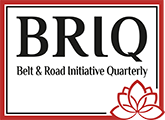
BRIQ (Belt & Road Initiative Quarterly) is currently seeking submissions for a special issue on “The Clash of Socioeconomic Systems in a Post-Coronavirus World”.
Branded by many as the most severe crisis since World War II, the novel coronavirus (COVID-19) pandemic will certainly mark a defining moment in the history of capitalism.
The failure of wealthy, or advanced capitalist countries to contain the crisis, to ensure the people’s livelihood and to prevent human tragedies makes one question the credibility of neoliberalism as a development paradigm that has been imposed over the past four decades.
On the one hand, there has been a strong resistance to acknowledging the crisis of global capitalism on the part of neoliberal governments in the Western world. Certain Western politicians keep insisting on private healthcare practices and ultra-capitalist measures that prioritize the survival of corporations (and the wealthy elite) at the expense of mass unemployment and enormous human suffering. They also promote a racist language around COVID-19 and used this crisis to justify economic sanctions and other imperialist measures.
On the other hand, public debates are increasingly focused on the potential efficacy of state-led policies that go against neoliberal orthodoxy. In several instances, individualistic discourses lose currency in favor of collectivistic values that encourage public interests, solidarity, and global cooperation away from the politics of fear. Key countries that stand for a more inclusive, or multipolar world (e.g. China, Russia, Cuba) take the lead in bringing these humane and collectivistic values to life.
In the end, the above-mentioned conflicting tendencies embodied in the COVID-19 conjuncture are likely to unveil a slowly brewing clash of socioeconomic systems in the post-Coronavirus world.
Based on the context depicted above, the Belt & Road Initiative Quarterly (BRIQ) calls for essays and academic articles that address issues related (but not limited) to the following areas:
- The crisis of global health governance,
- The failure of neoliberalism in the context of the COVID-19 pandemic,
- The transformation of capitalism in a post-COVID-19 world,
- The rise of state-led and/or collectivistic, community-based alternatives,
- Opportunities for global health and/or economic cooperation,
- COVID-19 and imperialism,
- COVID-19 and racism,
- COVID-19 and multipolarity,
- China’s (and other countries) experience in addressing the COVID-19 pandemic and/or lessons to be drawn from the struggle against COVID-19,
- The political economy of COVID-19,
- The geopolitics of COVID-19.
Deadline for Paper Submissions: May 20, 2020
Journal Information and Submission Guidelines
BRIQ (Belt & Road Initiative Quarterly) is a scholarly journal of international politics, economy, and culture.
Belt and Road Initiative Quarterly (BRIQ) features a broad range of content, from academic articles to book reviews, review essays, interviews, news reports, and feature articles.
The Editorial Board can issue calls for papers for special issues and invite authors to contribute manuscripts; however, it also welcomes unsolicited submissions.
Submissions are invited in English or Turkish. All submissions are to include a short biography (150-word limit) and should be sent as Microsoft Word attachments to briq@briqjournal.com . Articles or other content that have been previously published or are under review by other journals will not be considered for publication.
BRIQ follows American Psychology Association style (6th edition, https://www.apastyle.org) and uses American English spelling.
BRIQ uses a double-blind review process for all academic articles.
Academic articles should be between 5,000 and 9,000 words in length, including abstracts, notes, references, and all other content. Please supply a cover page that includes complete author information, and a fully anonymized manuscript that also contains an abstract (200- word limit) and 5 keywords.
Book reviews should not exceed 1,000 words; review essays covering two or more works can be up to 3,000 words.
News reports consisting of brief analyses of news developments should not exceed 1,500 words; feature articles combining reporting and analysis can be up to 3,500 words.
Please contact the Editorial Board for interview proposals.
